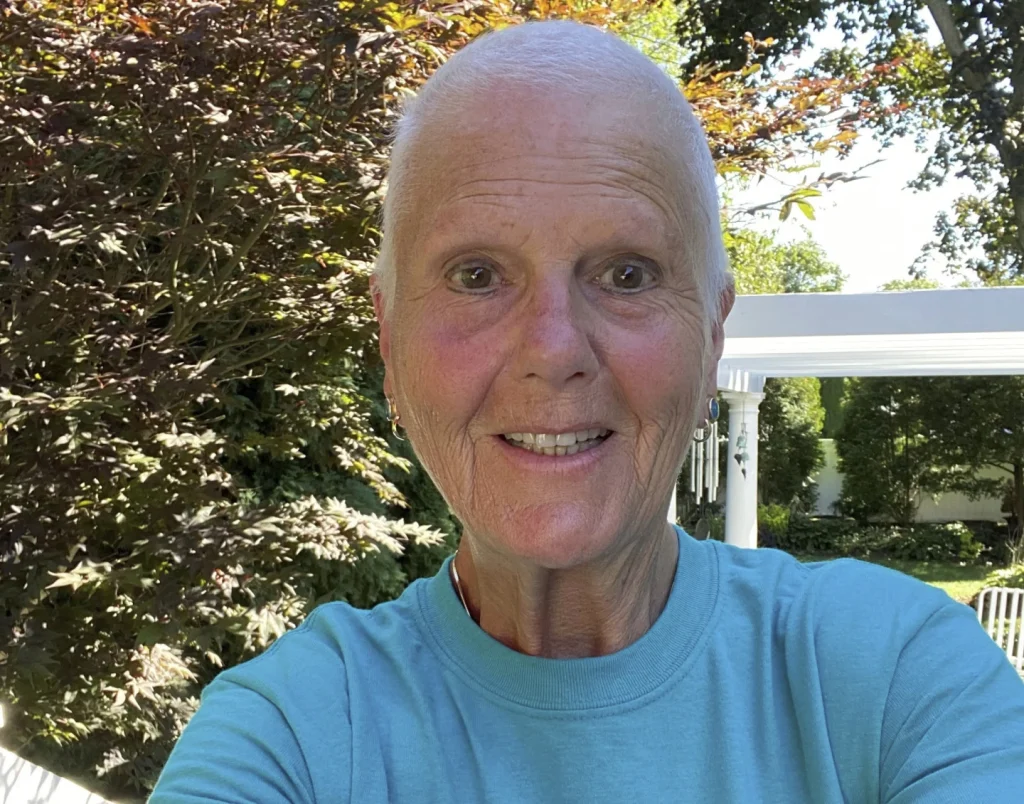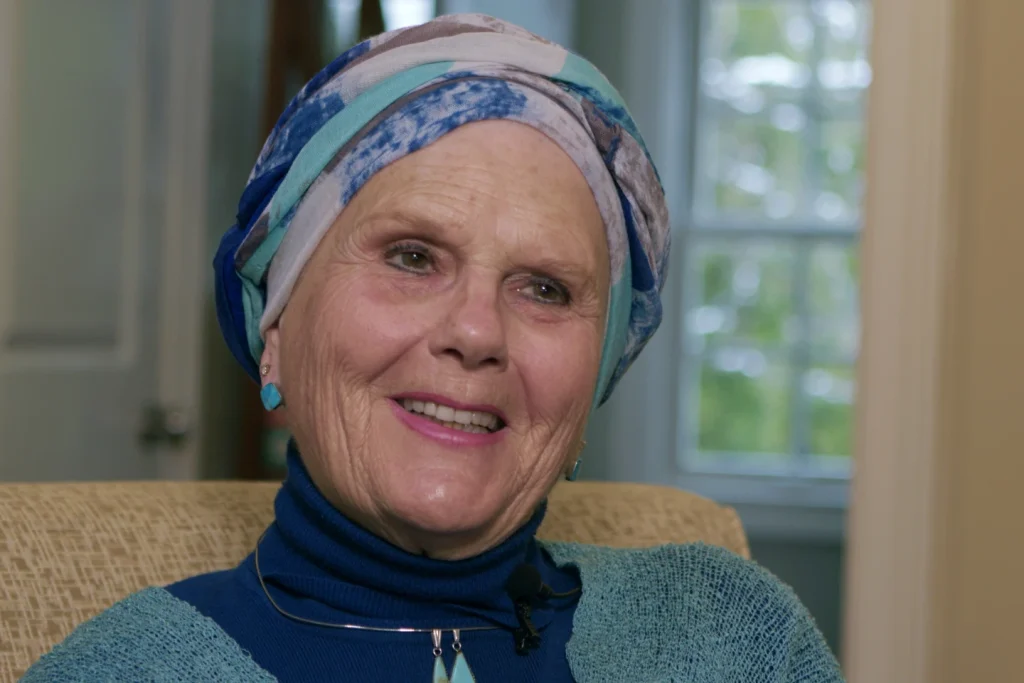Lynda Bluestein’s passing in Vermont on Thursday marked a significant moment in the ongoing debate surrounding end-of-life care and the right to die.
Bluestein, a Connecticut woman who had been battling terminal cancer, was a vocal advocate for expanded access to Vermont’s law that allows terminally ill individuals to receive lethal medication to end their lives on their own terms.
Her decision to end her life through prescribed medication was a deeply personal one, and her husband, Paul, described her passing as “comfortable and peaceful,” reflecting her wishes for a dignified and pain-free end.
Bluestein’s last words, as recounted by her husband, spoke to the relief she felt in no longer having to endure the suffering brought on by her terminal illness.
This sentiment underscores the profound impact that end-of-life choices can have on individuals facing terminal illnesses, and it highlights the importance of ensuring that individuals have the autonomy to make decisions about their own end-of-life care.
The legal battle that Bluestein and the organization Compassion & Choices waged against Vermont’s residency requirement in its end-of-life law serves as a reminder of the complex legal and ethical issues surrounding the right to die.
The lawsuit, filed in 2022, challenged the constitutionality of Vermont’s residency requirement, arguing that it violated several clauses of the U.S.
Constitution, including the commerce, equal protection, and privileges and immunities clauses.
This legal challenge reflects the broader national conversation about end-of-life care and the need for laws and policies that respect individuals’ autonomy and dignity in making decisions about their own deaths.
Bluestein’s advocacy and legal battle have brought attention to the need for expanded access to end-of-life options for terminally ill individuals, regardless of their state of residence.
The right to die with dignity is a deeply personal and morally complex issue, and it is one that requires careful consideration of the legal, ethical, and practical implications.
Bluestein’s case has underscored the need for a nuanced and compassionate approach to end-of-life care, one that respects individuals’ autonomy and ensures that they have the support and resources they need to make informed decisions about their own deaths.
As we reflect on Lynda Bluestein’s passing and her advocacy for expanded access to end-of-life options, it is essential to consider the broader implications of her story.
Her courage in sharing her journey and her commitment to fighting for the rights of terminally ill individuals have sparked important conversations about end-of-life care and the right to die with dignity.
It is our responsibility as a society to continue these conversations and to work towards creating a more compassionate and inclusive approach to end-of-life care, one that honors the autonomy and dignity of every individual, regardless of their state of residence.
The issue of medically assisted suicide has been a topic of intense debate and controversy in the United States for many years.
Last March, the state of Vermont agreed to a settlement that allowed a non-resident, Lynda Bluestein, to use the state’s law to end her life.
Two months later, Vermont made accommodations available to anyone in similar circumstances, making it the first state in the country to change its law to allow terminally ill people from out of state to take advantage of it to end their lives.
This decision has sparked a range of reactions from individuals and organizations across the country. Some have praised Vermont for its progressive approach to end-of-life care, while others have expressed concerns about the potential implications of such a law.
Regardless of one’s stance on the issue, it is clear that this development has significant implications for the future of end-of-life care in the United States.
One of the key arguments in favor of Vermont’s decision is the idea of providing individuals with the autonomy to make decisions about their own end-of-life care.
Lynda Bluestein, the individual at the center of this case, was a strong advocate for the right to access medically assisted suicide.
Her advocacy, along with the support of others, ultimately led to the change in Vermont’s law. As State Senator Claire Ayer stated, “Lynda was an advocate all the way through, and she wanted access to this law and she had it, but she and everybody deserves to have access much closer to home because the need to travel and to make arrangements around the scheduling to come to Vermont is not something that we wish for people to have.”
This sentiment reflects a broader push for greater access to end-of-life options for individuals across the country.
The ability to make decisions about one’s own end-of-life care is a deeply personal matter, and many believe that individuals should have the right to choose when and how they will end their lives if they are facing terminal illness and unbearable suffering.
On the other hand, there are those who have raised concerns about the potential implications of allowing non-residents to access medically assisted suicide in Vermont.
Some worry that this could lead to a “suicide tourism” phenomenon, where individuals from other states may travel to Vermont specifically to access this option.
There are also concerns about the potential for abuse and exploitation, as well as the broader ethical and moral implications of medically assisted suicide.
It is important to note that Vermont is not the only state grappling with these issues. Currently, ten states in the U.S. allow medically assisted suicide, and the laws and regulations surrounding this practice vary widely from state to state.
Before Vermont changed its law, only one state—Oregon—allowed non-residents to access medically assisted suicide, and this was due to a court settlement that bypassed the residency requirement.
Oregon then went on to remove that requirement this past summer, further expanding access to medically assisted suicide for individuals from out of state.
As the debate around medically assisted suicide continues to evolve, it is crucial for policymakers, healthcare professionals, and the public to engage in thoughtful and informed discussions about the complex ethical, legal, and practical considerations at play.
While there are valid concerns about the potential implications of expanding access to medically assisted suicide, there is also a compelling argument for providing individuals with the autonomy to make decisions about their own end-of-life care.
In the end, the case of Lynda Bluestein and the subsequent changes to Vermont’s law serve as a reminder of the importance of addressing the needs and concerns of individuals facing terminal illness.
As State Senator Claire Ayer aptly stated, “more than a silver lining is the beauty and the peace that came from Lynda having a say in what happened at the very end of her life.”
This sentiment encapsulates the heart of the matter—ensuring that individuals facing terminal illness have the ability to make choices that align with their values, beliefs, and desires for their end-of-life care.
Vermont’s law, enacted in 2013, permitting physicians to prescribe lethal medication to individuals with a terminal illness expected to end their lives within six months has ignited a contentious debate.
Advocates assert that the law is underpinned by rigorous safeguards to protect patients, while opponents argue that it lacks the necessary protections against coercion.
This essay aims to explore the multifaceted moral and ethical dimensions surrounding Vermont’s physician-assisted suicide law, delving into the perspectives of both proponents and critics.
Additionally, it will examine the poignant personal testimony of a passionate activist, shedding light on the deeply personal and profound impact of end-of-life choices.
Proponents of Vermont’s law emphasize the presence of stringent safeguards aimed at ensuring that patients are making informed and voluntary decisions.
Central to these safeguards is the requirement for individuals seeking to utilize the law to demonstrate their capacity to make and communicate healthcare decisions to a physician.
Furthermore, patients are mandated to make two oral requests to a physician over a specified timeframe, followed by a written request signed in the presence of impartial witnesses.
These witnesses are tasked with affirming that the patient appeared to comprehend the nature of the document and were free from any form of coercion or undue influence.
Advocates argue that the law offers individuals facing terminal illnesses the autonomy to make choices aligned with their deeply held values and beliefs.
The ability to have agency over the timing and manner of their death is seen as a fundamental aspect of human dignity and self-determination.
By granting individuals the option to pass away in a manner consistent with their desires, the law is perceived as affording a sense of control and relief in the face of profound suffering.
Conversely, opponents of Vermont’s physician-assisted suicide law express moral and ethical objections, citing concerns about the potential for abuse and the absence of adequate safeguards to protect vulnerable patients.
They argue that the legalization of assisted suicide may engender a climate in which individuals facing serious illnesses feel pressured to end their lives prematurely, particularly in the absence of robust protections against coercion.
Furthermore, opponents contend that the intrinsic value of human life is undermined by the normalization of physician-assisted suicide, potentially leading to societal desensitization to the sanctity of life.
Moreover, opponents raise apprehensions about the potential for disparities in access to end-of-life care, particularly for individuals from marginalized or disadvantaged backgrounds.
They caution against the risk of exacerbating existing inequalities in healthcare, with concerns that vulnerable populations may be disproportionately affected by the implications of the law.
The poignant testimony of Bluestein, a fervent activist who has ardently advocated for similar legislation in other states, provides a deeply personal insight into the profound impact of end-of-life choices.
Her poignant narrative underscores the deeply intimate and existential nature of the decision to seek a dignified and timely death.

Bluestein’s desire to pass away surrounded by loved ones and to retain agency over the final chapter of her life epitomizes the deeply personal and deeply human aspects of the debate surrounding physician-assisted suicide.
In conclusion, Vermont’s physician-assisted suicide law has sparked a complex and polarizing discourse, encompassing moral, ethical, and deeply personal considerations.
The clash between proponents and opponents underscores the intricate balance between individual autonomy, safeguarding against coercion, and the sanctity of life.
While the law seeks to provide individuals with the agency to make deeply personal end-of-life decisions, it is imperative to continue evaluating and refining the safeguards in place to ensure the protection of vulnerable patients.
The testimony of individuals like Bluestein serves as a poignant reminder of the deeply personal and existential nature of end-of-life choices, underscoring the need for a nuanced and empathetic approach to this contentious issue.
